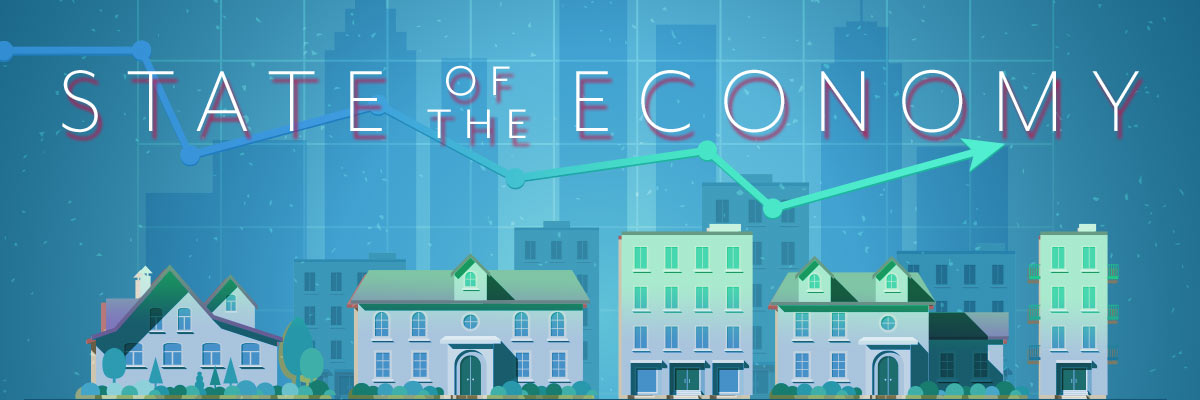Tracking the State of the Economy: GDP and Unemployment
July 30, 2020
 On Thursday, July 30, 2020, the Bureau of Economic Analysis released gross domestic product (GDP) data which revealed what most already knew—that the U.S. economy suffered historic losses in the 2nd quarter. GDP contracted at an annualized rate of 32.9% in the 2nd quarter of 2020, the worst drop on record. This data does not mean that the economy shrank by a third. The annualized rate is often used to report on changes in the economy; however, it is not as helpful a concept during this period. The annualized rate assumes that the GDP change in the 2nd quarter would also be experienced over the following 3 quarters—that is, over a whole year. Looking ahead to the 3rd quarter, it is very likely that economic conditions will improve.
On Thursday, July 30, 2020, the Bureau of Economic Analysis released gross domestic product (GDP) data which revealed what most already knew—that the U.S. economy suffered historic losses in the 2nd quarter. GDP contracted at an annualized rate of 32.9% in the 2nd quarter of 2020, the worst drop on record. This data does not mean that the economy shrank by a third. The annualized rate is often used to report on changes in the economy; however, it is not as helpful a concept during this period. The annualized rate assumes that the GDP change in the 2nd quarter would also be experienced over the following 3 quarters—that is, over a whole year. Looking ahead to the 3rd quarter, it is very likely that economic conditions will improve.
Over the April through June period, GDP fell by 9.5%, which is not the annualized rate. However, no matter how the GDP change is measured, the 2nd quarter decline represents the biggest economic contraction in the post-World War II era. By comparison, the worst quarter during the 2008 recession was an 8.4% GDP decline in Q4 2008.
The same day the GDP data were announced, the Department of Labor released data that showed that the number of Americans applying for unemployment benefits increased for the 2nd week in a row. An estimated 1.4 million people filed for unemployment benefits in the week ending July 25. There has been a similar trend in Virginia. More than 46,000 Virginians applied for unemployment benefits last week, which was an increase from the week prior, and the second weekly increase in a row. About 345,000 Virginians continued to receive unemployment benefits.
The GDP and unemployment data released today demonstrates both the severity of the economic downturn, as well as the uncertain nature of the recovery. While economists generally expect the economy to turnaround in the 3rd quarter, there is growing consensus that the recovery has slowed. Consumer confidence faltered in July after improving in June. Rising COVID-19 cases, some in parts of Virginia, are forcing businesses to re-close and lay off workers. Workers are dealing with the ramifications of schools opening virtually.
This uncertainty in the economy means that Virginia REALTORS® should be prepared to continue to make use of the virtual tools and social distancing techniques that have helped sustain the housing market. Virginia REALTORS® will continue to support members with education and resources to help REALTORS® serve homebuyers and sellers.
You might also like…
5 Key Takeaways from the NAHREP 2023 State of Hispanic Homeownership Report
By Sejal Naik - April 17, 2024
In March 2024, the National Association of Hispanic Real Estate Professionals (NAHREP) released its 2023 State of Hispanic Homeownership Report. Using data from surveys conducted by various public… Read More
3 Multifamily Market Trends from the First Quarter
By Dominique Fair - April 16, 2024
For the last three years, the multifamily market has seen high demand, double digit rent growth, and increased construction to meet demand. These trends are expected to shift… Read More
Virginia’s Housing Market Sees Largest Influx of New Listings Since 2021
By Robin Spensieri - March 29, 2024
According to the February 2024 Virginia Home Sales Report released by Virginia REALTORS®, pace in Virginia’s housing market picked up last month. There were 6,733 homes sold statewide in February,… Read More